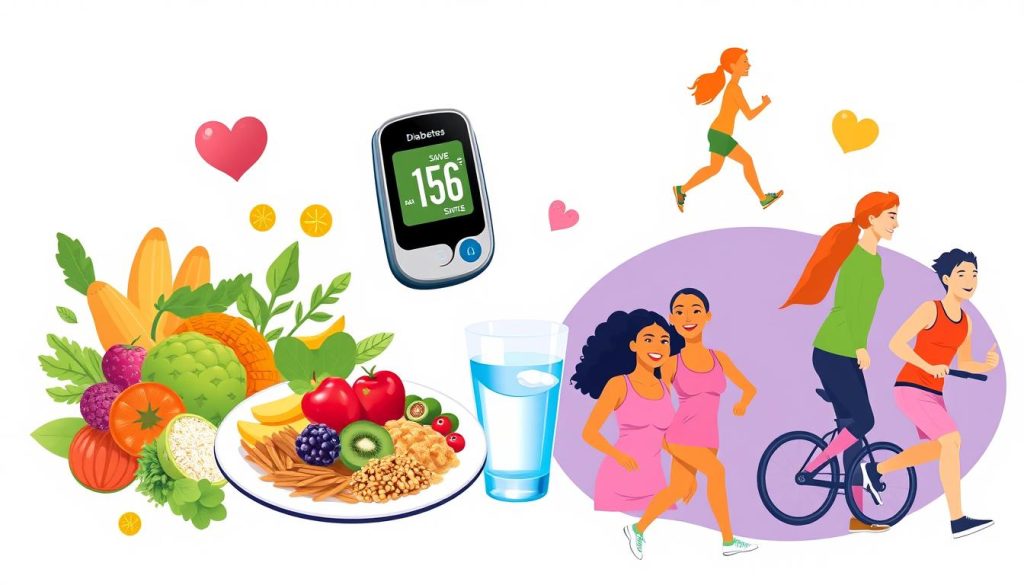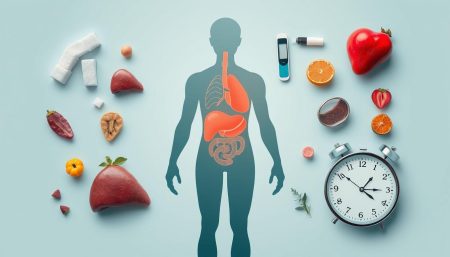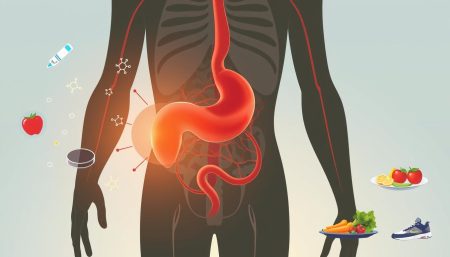Mellitus diabetes is a health challenge that needs careful attention and a dedicated approach to diabetes management. It affects millions worldwide, making it important to understand its details. This article aims to give you the knowledge and diabetes care tips you need to manage it well.
Knowing how to care for diabetes can empower you to live a fulfilling life despite your diagnosis. We will cover types, symptoms, and treatments in the following sections. Our journey starts here, focusing on awareness and education in diabetes management.
Keep reading for evidence-based strategies and care tips to help you manage your health. Our goal is to improve your quality of life through effective diabetes management and self-care.
What Is Mellitus Diabetes?
Mellitus diabetes, also known as diabetes, is a metabolic disorder. It happens when blood sugar levels stay high for a long time. This can be due to the pancreas not making enough insulin or the body’s cells not responding well to insulin.
Keeping blood sugar levels normal is key to managing diabetes. It helps prevent serious health problems later on.
Insulin and blood sugar levels are closely linked in mellitus diabetes. Insulin, made by the pancreas, helps cells use glucose for energy. If this process fails, blood glucose levels rise, marking diabetes.
- Increased thirst and frequent urination are common diabetes symptoms resulting from high blood sugar levels.
- Unexpected weight loss, even when eating habits remain unchanged, might suggest the body is not efficiently using glucose for energy.
- Fatigue often occurs if the body’s cells lack glucose.
Knowing how mellitus diabetes affects blood sugar processing is vital. It shows why managing this chronic condition is so urgent. This knowledge helps us understand the different types of diabetes and their treatments.
Differentiating Type 1 and Type 2 Diabetes
It’s important to know the differences between type 1 and type 2 diabetes. This helps us understand their risk factors and how to manage our health. Both types affect blood sugar levels, but they start and affect the body in different ways.
Defining Type 1 Diabetes
Type 1 diabetes usually starts in kids or teens. It happens when the body’s immune system attacks the cells that make insulin. Without insulin, the body can’t turn glucose into energy, causing high blood sugar.
This means people with type 1 diabetes need insulin their whole lives.
Understanding Type 2 Diabetes
Type 2 diabetes starts in adults and is linked to lifestyle and genes. It happens when the body can’t use insulin well or doesn’t make enough. Unlike type 1, type 2 can sometimes be managed or delayed with a healthy lifestyle.
Comparison of Onset and Risk Factors
Knowing when and why each type of diabetes starts is key. Type 1 diabetes comes on quickly and affects younger people. Type 2 diabetes takes longer to develop and is more common in older adults. It’s linked to obesity, age, and not being active.
| Type 1 Diabetes | Type 2 Diabetes |
|---|---|
| Autoimmune disorder | Insulin resistance |
| Usually diagnosed in children/teens | Mostly diagnosed in adults |
| Immediate insulin dependence | Possible to manage through lifestyle changes |
| No known methods to prevent | Preventable or delayable with healthy habits |
Recognizing the Signs of Diabetes
Spotting diabetes symptoms early is key to managing the condition well. Knowing the signs can lead to quick diagnosis and treatment. This can greatly improve your health and life quality.
Common Symptoms of Mellitus Diabetes
Diabetes, in both types, often shows similar signs. These include feeling very thirsty, needing to pee a lot, feeling extremely tired, and blurry vision. It’s important to recognize these symptoms to get medical help fast.
Diabetes Symptoms Exclusive to Women
Women might notice unique symptoms like frequent yeast infections, polycystic ovary syndrome (PCOS), and oral thrush. These signs are important for catching diabetes early.
When to Seek Medical Attention
If you notice any diabetes signs that don’t go away, see a doctor right away. Quick action can stop serious problems and help manage the disease better. This ensures a healthier future.
Exploring the Causes of Mellitus Diabetes
Understanding the causes of diabetes is complex. It involves genetics, environment, and lifestyle. Each factor affects the risk and how well we manage diabetes. Let’s look at these factors and how they might lead to diabetes.
Genetics is a key cause of diabetes. If your family has diabetes, you’re more likely to get it. But, things like viruses or early cow’s milk can also trigger it.
Our lifestyle choices are also important. What we eat, how active we are, and our weight all matter. Let’s see how these choices impact diabetes risk:
| Factor | Impact on Diabetes Risk |
|---|---|
| Diet | Too much sugar and processed foods raises risk |
| Physical Activity | Exercise lowers risk a lot |
| Body Weight | Being overweight, like with obesity, is a big risk for Type 2 diabetes |
To manage diabetes well, we need to change our diet and exercise. Knowing what causes diabetes helps us make better choices. This way, we can prevent or manage diabetes better.
- Check your family history and genetic risk.
- Eat a balanced diet with less processed foods and sugar.
- Make exercise a part of your daily life.
- Keep a healthy weight to lower Type 2 diabetes risk.
By focusing on these areas, we can prevent or manage diabetes better. This helps us stay healthy and lowers our risk.
Interpreting Blood Sugar Levels
Knowing how to read blood sugar levels is key to managing diabetes. It helps people make smart choices about what they eat, how much they exercise, and their medicine. Understanding these numbers is vital for keeping diabetes under control.
Understanding Normal Blood Sugar Ranges
Normal blood sugar levels change throughout the day and after meals. These ranges are important for guiding diet and medicine choices. Let’s look at what these numbers mean and how they affect diabetes care.
The Significance of Glycemic Index
The glycemic index (GI) ranks foods by how fast they raise blood sugar. Foods with a low GI cause slower rises, helping control blood sugar. Knowing which foods have low, medium, or high GI is key for diabetes diet planning.
| Food Type | GI Range |
|---|---|
| Low GI Foods | 1-55 |
| Medium GI Foods | 56-69 |
| High GI Foods | 70+ |
Choosing low GI foods helps keep blood sugar stable. It prevents sudden spikes and ensures balanced nutrition. Using this knowledge in daily meals is essential for managing diabetes long-term.
The Role of Insulin in Diabetes Management
Managing diabetes well means knowing how insulin helps control blood sugar. For those who need insulin, learning about insulin therapy is key. This part will explore the different insulin treatments and how to live with insulin for better diabetes management.
Different Forms of Insulin Therapy
Insulin therapy is vital for those with insulin-dependent diabetes. There are many types, from quick-acting to long-lasting, each suited for different needs and lifestyles.
| Type of Insulin | Onset | Duration |
|---|---|---|
| Rapid-acting | 15 minutes | 3-5 hours |
| Short-acting | 30 minutes | 6-8 hours |
| Intermediate-acting | 1-2 hours | 12-18 hours |
| Long-acting | 1 hour | Up to 24 hours |
Adjusting to an Insulin-Dependent Lifestyle
Getting used to an insulin-dependent life can be tough but doable. It’s important to have a routine that includes checking blood sugar, knowing when to take insulin, and how food and exercise affect it.
Good diabetes management needs a supportive team, learning resources, and a patient who takes charge. With these, living with insulin can be rewarding.
Nutritional Management for Diabetes Patients
Effective nutritional management is key for diabetes care. It helps control blood sugar and supports overall health. A good diabetic diet balances nutrients to keep energy up and blood sugar stable.
Creating a Balanced Diabetic Diet
A balanced diabetic diet focuses on the right carbs, portion sizes, and food variety. It’s important to eat complex carbs, fiber-rich foods, and lean proteins. This helps keep blood sugar stable. Here are some key principles:
- Eat consistent meals at regular times to keep blood sugar steady.
- Include high-fiber veggies and whole grains to slow sugar absorption.
- Choose lean proteins like chicken, fish, and plant-based options for better nutrition and fullness.
- Limit processed and high-sugar foods to avoid blood sugar spikes.
Carbohydrates and Diabetes: What to Know
The link between carbs and diabetes is often unclear. Carbs are vital for energy, but picking the right types is key. Here’s what patients should know:
- Choose complex carbs like whole grains, legumes, and veggies for sustained energy and lower glycemic index.
- Avoid simple sugars and refined carbs to prevent blood sugar spikes.
- Keep track of carbs through counting or using a glycemic index guide for better choices.
Good nutritional management can greatly improve life for those with diabetes. A diabetic diet is essential for daily life. It helps manage carbohydrates and diabetes and overall health.
Physical Activity as a Control Mechanism for Diabetes
Regular physical activity is key for a healthy life and managing diabetes. It can greatly affect blood sugar levels. This helps control diabetes and improves overall health.
Exercise is vital for diabetes management. It helps control weight, lowers blood pressure, and improves heart health. These benefits are important for people with diabetes, as they reduce risks and make the body more responsive to insulin.
Starting a new fitness regime can seem tough, but it’s doable. Here are some tips to make it easier:
- Begin with short intervals: Just 10-15 minutes of walking a day can make a big difference.
- Incorporate variety: Try different activities like cycling, yoga, swimming, or jogging to keep it fun.
- Use tech aids: Fitness trackers can help stay motivated and track progress.
- Set realistic goals: Start with small goals and gradually increase the intensity and duration of workouts.
Adding physical activity to your diabetes management plan is beneficial. It not only helps control diabetes but also boosts mental health and quality of life. Seeing exercise as a way to improve overall health is key.
It’s important to talk to your healthcare provider before starting any new exercise. They can help choose activities that fit your health and diabetes plan. This helps avoid injuries and ensures the best diabetes control.
It’s also important to watch how your body reacts to different exercises. Knowing how blood sugar levels change before and after exercise helps manage diabetes better. This way, you can pick activities that are fun and good for keeping blood sugar levels stable.
Start your journey to better health with regular physical activity. It will make a big difference in managing diabetes and improving your overall well-being.
Medications and Treatments for Diabetes
Managing diabetes often means making lifestyle changes and using medicine. Thanks to diabetes advancements, there are many treatments now. This section looks at oral medications and the latest in diabetes treatment.
Oral Medications and Their Effects
Oral medications for diabetes are key for type 2 diabetes. They help control blood sugar and are often the first choice before insulin. Each type works differently but all aim to lower blood sugar and make insulin work better.
Metformin is a common one that lowers liver glucose. Sulfonylureas increase insulin from the pancreas. DPP-4 inhibitors also help by making insulin last longer.
Advancements in Diabetes Treatment Options
The world of diabetes treatment is always changing. New research brings better treatments that help patients more. GLP-1 receptor agonists like Ozempic are a big step forward. They help control blood sugar, aid in weight loss, and improve heart health. For more on Ozempic, check out this guide.
| Medication | Primary Action | Benefits |
|---|---|---|
| Metformin | Reduces liver glucose production | Improves insulin sensitivity, does not cause weight gain |
| Sulfonylureas | Increases pancreatic insulin production | Effectively lowers blood sugar, cost-efficient |
| DPP-4 Inhibitors | Enhances incretin hormones | Stable blood sugar control with minimal side effects |
| GLP-1 Receptor Agonists | Mimics glucagon-like peptide-1 | Supports weight loss, lowers blood sugar, improves heart health |
Using these advancements in diabetes treatment options improves health. It shows a hopeful future for managing diabetes.
Monitoring and Managing Diabetes at Home
Managing diabetes at home needs the right tools and a commitment to regular routines. A key tool is a reliable glucose meter. It lets people track their blood sugar levels easily. This makes consistent blood sugar monitoring simple and effective.
Choosing the Right Glucose Meter
When picking a glucose meter, look at accuracy, ease of use, test time, and data storage. Choose meters that store lots of data and show blood sugar trends. Health experts can help pick the best meter for you based on your health and lifestyle.
Tips for Consistent Blood Sugar Monitoring
- Check your blood sugar at the same times every day.
- Use a logbook or apps to track your levels and see trends.
- Calibrate your glucose meter often to get accurate readings.
- Always carry your glucose meter, even when you’re out.
| Feature | Benefit |
|---|---|
| Accuracy | Ensures reliable data for making health decisions |
| Easy to use | Facilitates regular use, even for those with physical limitations |
| Fast test time | Reduces inconvenience, encouraging more frequent testing |
| Data Storage | Allows tracking over time to spot patterns and adjust treatment |
Using a good glucose meter and sticking to a monitoring routine helps manage diabetes at home. This approach not only keeps health in check but also empowers patients to take charge of their wellbeing.
Mental Health: Coping with a Diabetes Diagnosis
Getting a diabetes diagnosis can be tough, affecting both body and mind. It’s key to learn how to handle mental health and diabetes together. This includes dealing with diabetes-related stress and building a strong diabetes support system.
Dealing with Diabetes-Related Stress
Diabetes can cause a lot of emotional stress. You might feel anxious, deny the diagnosis, get angry, or feel depressed. It’s important to find ways to cope with these feelings. Things like counseling, mindfulness, and stress-reducing activities can help a lot.
Building a Support System
Having a strong support system is very important for people with diabetes. This group can include family, friends, doctors, and support groups. They offer emotional support and practical advice, helping you deal with daily challenges and improve your well-being.
| Support System Component | Benefits |
|---|---|
| Family and Friends | Provide emotional support and assist in lifestyle adjustments. |
| Healthcare Providers | Offer medical guidance, treatment options, and monitoring health progress. |
| Support Groups | Share experiences, tips, and encouragement from people who understand the journey. |
Understanding and Preventing Diabetes Complications
Managing diabetes well is key to staying healthy every day. It also helps avoid serious health problems. These problems can affect many parts of the body, so stopping them early is very important.
Common Diabetes-Related Health Issues
Diabetes can lead to heart and kidney diseases, vision loss, and nerve damage. Heart problems are common because diabetes can cause arteries to harden. This can lead to heart attacks and strokes.
Kidney issues are also common. High blood sugar can make it hard for kidneys to filter blood. If not treated, it can lead to needing dialysis.
Strategies to Reduce Complication Risks
Preventing complications is key to avoiding serious problems. Keeping blood sugar levels in check, eating right, and exercising regularly are basic steps. Also, seeing your doctor regularly is important to keep track of your health and adjust your treatment if needed.
Tracking prevention methods can help you manage risks better.
| Complication | Prevention Strategy | Impact of Strategy |
|---|---|---|
| Cardiovascular Disease | Regular aerobic exercise | Improves heart health and circulation |
| Kidney Damage | Controlled blood sugar and blood pressure | Reduces kidney stress, decreasing the progression rate of kidney disease |
| Neuropathy | Tight glycemic control | Slows the progression of nerve damage |
| Retinopathy | Regular retinal screenings | Early detection and treatment to prevent vision loss |
Lifestyle Modifications for Optimal Diabetes Control
Effective diabetes control needs big changes in how we live. Making small changes in our daily habits can make a big difference. It’s important to focus on what we eat, how much we move, and our weight.
Importance of Weight Management in Diabetes
Keeping a healthy weight is key to managing diabetes. Being overweight can make it harder for your body to use insulin. Eating right and staying active can help you manage your weight and keep your blood sugar stable.
- Eat more foods high in fiber to help control blood sugar.
- Use portion control to avoid eating too much.
- Make sure to get some exercise every day.
Smoking and Alcohol Use in Diabetic Patients
Smoking and drinking too much alcohol can make diabetes worse. Smoking raises your risk of heart disease. Drinking too much can make you gain weight and mess with your blood sugar.
| Factor | Impact on Diabetes | Recommendations |
|---|---|---|
| Smoking | Increases cardiovascular risk, affects blood sugar levels | Cessation programs, nicotine replacement therapies |
| Alcohol Consumption | Can cause weight gain and blood sugar fluctuations | Limit intake, adhere to dietary guidelines |
To learn more about how lifestyle changes can help with diabetes control, check out more information. Making smart choices about what we eat and how we move can help control our blood sugar. It can also make us feel better and live a healthier life.
Diabetes Care: The Importance of Regular Check-Ups
Regular check-ups and diabetes education are key to good diabetes care. They help manage the condition well and prevent serious problems later on.
Working with Your Healthcare Team
Having a good relationship with your healthcare team is vital. Regular visits let them check your blood sugar and adjust your meds if needed. It’s also a chance to talk about any health concerns.
These meetings help you stay on top of your health. You can share any new symptoms or changes in your condition.
The Role of Continuous Education in Diabetes Management
Learning about diabetes is an ongoing process. It helps you understand and manage your condition better. You can learn about nutrition, exercise, and tracking your blood sugar.
By keeping up with education, you can stay current with the latest treatments and lifestyle changes. This is important for managing diabetes well.
Staying educated about diabetes gives you the power to make smart health choices. It doesn’t matter if you’re new to diabetes or have been managing it for years. Education is a powerful tool for effective care.
Advocacy and Awareness: Living Beyond Mellitus Diabetes
Living with diabetes means more than just managing it every day. It’s about being active in diabetes advocacy and diabetes awareness. By doing so, we can help change society for the better, making life easier for everyone affected.

Teaching others about diabetes awareness helps clear up myths and reduce shame. Through diabetes advocacy, we push for better policies that support research and healthcare.
- Participating in community outreach programs.
- Sharing personal stories to broaden diabetes awareness.
- Advocating for improved healthcare policies.
One key way to live with diabetes is to join in on events and programs. These help spread awareness and teach others about managing diabetes.
| Activity | Purpose | Impact on Community |
|---|---|---|
| Diabetes Workshops | Education on managing diabetes | Increases self-management skills |
| Fundraising for Research | Financial support for diabetes research | Encourages advancements in treatment |
| Health Fairs | Screenings and awareness | Early detection and prevention |
Being an advocate does more than help ourselves. It opens doors to new treatments and ways to manage diabetes. So, every person’s role in diabetes advocacy and awareness is very important.
Diabetes in Youth: Special Considerations for Care
The number of diabetes in youth cases has gone up a lot. This means we need to focus more on special diabetes care for kids and teens. Managing diabetes in young people is hard because of their growth, emotional needs, and ability to handle their illness.
It’s important to understand these challenges to provide the right care. This care should meet the unique needs of young people with diabetes.
Young patients need special diabetes management plans. These plans should be made with their growth and needs in mind. Healthcare providers need to teach them about self-care, monitoring, and adjusting treatment as they grow.
It’s also key to support their emotional well-being. Diabetes can affect how they feel about themselves and their relationships with friends.
Getting the whole family involved in care is very important for diabetes in youth. It helps create a supportive environment that promotes healthy living. This support is essential for managing diabetes well.
By focusing on individualized care and support, healthcare providers can help young people manage their diabetes effectively. This ensures they can live full and active lives despite their condition.
FAQ
Q: What is Mellitus Diabetes?
A: Mellitus diabetes, also known as diabetes, is a long-term condition. It affects how your body turns food into energy. High blood sugar levels are a key sign, caused by insulin problems.
Managing diabetes well is key to avoid serious health issues.
Q: What are the main differences between Type 1 and Type 2 Diabetes?
A: Type 1 diabetes is when your body attacks insulin-making cells. It often starts in kids or teens. Type 2 diabetes is more common and linked to lifestyle. It’s when your body can’t use insulin right.
Being active and managing weight are key to managing Type 2.
Q: What symptoms might indicate I have diabetes?
A: Signs of diabetes include needing to pee a lot, feeling very thirsty, and hungry. You might also lose weight, feel tired, see blurry, or have slow-healing sores. Women might notice vaginal infections, polycystic ovary syndrome, or skin changes.
See a doctor if you notice these signs.
Q: How does insulin therapy help in managing diabetes?
A: Insulin therapy is vital for Type 1 and some Type 2 diabetes. It helps control blood sugar by making up for insulin lack. There are different types of insulin, like injections and pumps.
Learning how to use insulin is important for managing it.
Q: Why are regular check-ups important for diabetes care?
A: Regular visits to your healthcare team are key for diabetes care. They help monitor your condition and adjust treatments. These visits also help catch problems early.
Learning new things during these visits is important for better health.
Q: What role does diet play in the management of diabetes?
A: Eating right is essential for diabetes management. It helps keep blood sugar levels in check. Diabetic diets should include a variety of foods, watching carbs and food’s glycemic index.
Q: How can physical activity help in managing diabetes?
A: Exercise is great for diabetes control. It lowers blood sugar, improves insulin use, and helps with weight. Regular activity also reduces heart disease risk and boosts mood.
Q: Can lifestyle modifications really improve diabetes control?
A: Yes, they can. Eating well, exercising, staying at a healthy weight, not smoking, and drinking less alcohol can greatly help. These changes can improve blood sugar control and overall health.
Q: What should I know about diabetes medications and treatments?
A: Diabetes management might include oral meds or insulin. There are many types of diabetes medications. Knowing about new treatments is important for managing diabetes well.


















